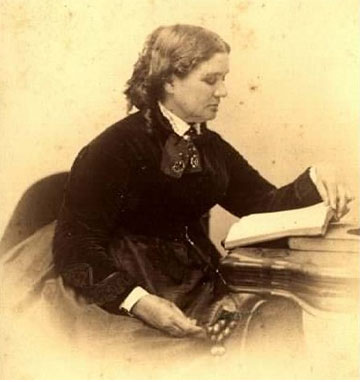Home-life, when one always stays at home, is necessarily narrowing. That is one reason why so many women are petty and unthoughtful of any except their own family’s interests. We have hardly begun to live until we can take in the idea of the whole human family as the one to which we truly belong.
Lucy Larcom, a well-published poet in her lifetime, is best known today for her autobiography, A New England Girlhood. She was an advocate for women’s rights to economic independence, child labor laws, and abolition. The Armstrong Browning Library owns three of her books. An Idyl of Work (1875) contains her inscription to a highly regarded Quaker poet: “John G. Whittier from his friend Lucy Larcom, June 1895.” Landscape in American Poetry (c.1879) contains illustrations on wood from drawings by J. Appleton Brown (1844–1902), an American painter nicknamed “Apple Blossom Brown” because of his penchant for poetic and light-filled compositions with apple blossoms as the subject. Poems (1869) includes a portrait of the author from a magazine clipping. The Laurel Song Book: For Advanced Classes in Schools, Academies, Choral Societies, Etc. (1927) contain not only Lucy Larcom’s hymn, “Draw Thou, My Soul,” but also an excerpt from Robert Browning’s “Rabbi Ben Ezra,” the first song in the book.
Larcom also anonymously edited three volumes of John Greenleaf Whittier’s work. The ABL owns editions of these three books: Child-Life: A Collection of Poems (1871), which contains poems by Elizabeth Barrett Browning and Robert Browning, Child Life in Prose (1874), and Songs of Three Centuries (1876).
 The ABL also owns a nineteenth-century autograph album and scrapbook, which was once the property of Elizabeth Whittier Pickard, niece of John Greenleaf Whittier. It contains a letter, dated 20 October 1856, from Robert and Elizabeth Barrett Browning to J.G. Whittier, thanking him for his “book of manly and beautiful verse” (The Panorama and Other Poems (1856)). In addition the album also contains letters by Julia Ward Howe, J.T. Fields, Edward Everett, and an undated note by Whittier to his nephew, Greenleaf. Notes and autograph signatures by Phoebe Cary, U.S. Grant, Alice Cary, Emily Faithfull, Thomas Wentworth Higginson, Ralph Waldo Emerson, Bayard Taylor, A. Bronson Alcott, Henry W. Longfellow, Daniel Webster, Celia Thaxter, William Cullen Bryant, Edward Everett, William Lloyd Garrison, Joaquin Miller, P.T. Barnum, Edward E. Hale, Oliver Wendell Holmes, George and Louis MacDonald, and many others are scattered throughout. The album also contains an autograph poem by Lucy Larcom, encouraging the owner of the album to hold her own name, Elizabeth, sacred.
The ABL also owns a nineteenth-century autograph album and scrapbook, which was once the property of Elizabeth Whittier Pickard, niece of John Greenleaf Whittier. It contains a letter, dated 20 October 1856, from Robert and Elizabeth Barrett Browning to J.G. Whittier, thanking him for his “book of manly and beautiful verse” (The Panorama and Other Poems (1856)). In addition the album also contains letters by Julia Ward Howe, J.T. Fields, Edward Everett, and an undated note by Whittier to his nephew, Greenleaf. Notes and autograph signatures by Phoebe Cary, U.S. Grant, Alice Cary, Emily Faithfull, Thomas Wentworth Higginson, Ralph Waldo Emerson, Bayard Taylor, A. Bronson Alcott, Henry W. Longfellow, Daniel Webster, Celia Thaxter, William Cullen Bryant, Edward Everett, William Lloyd Garrison, Joaquin Miller, P.T. Barnum, Edward E. Hale, Oliver Wendell Holmes, George and Louis MacDonald, and many others are scattered throughout. The album also contains an autograph poem by Lucy Larcom, encouraging the owner of the album to hold her own name, Elizabeth, sacred.
Notes and Queries: In addition to the autograph album, The Armstrong Browning Library has four other letters by John Greenleaf Whittier and seventy-three books, many with interesting inscriptions.
Lucy Larcom’s poem to Elizabeth Whittier Pickard reads:
For the name thou bearest—
Tender love thou sharest.
Hold it sacred unto death
The dear name – Elizabeth.
Does the “tender love” and “dear name,” indicated by Lucy Larcom, that Pickard shared refer to Elizabeth Hussey Whittier, John Greenleaf Whittier’s sister?


